What I want EVERY parent to know about having a child with Down's syndrome
Down's syndrome is only one aspect of their personality
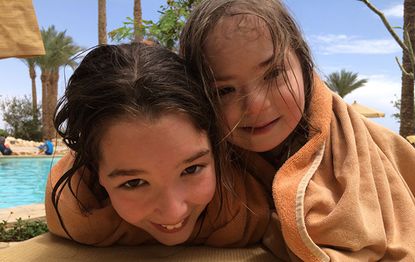
Around 775 children are born with Down's syndrome in the UK each year.
But despite an increase in awareness and visibility, there is still a long way to go to change perceptions of what it's like to have a child with the condition.
Hayley Goleniowska's second daughter Natty was born with Down's syndrome. Since then Hayley has created the world-renowned parenting blog Downs Side Up, to help challenge stereotypes and open up a discussion about life as a parent of a child with Down's syndrome.
Natty has since become the first child in the UK with a disability to star in a back-to-school fashion campaign, and is, as Hayley puts it, 'funny, and beautiful and clever and just absolutely hysterical'.
Hayley has spoken to us about how her own perception of Down's syndrome has changed since having Natty, and what every mum should know about having a baby with Down's syndrome...
Your preconceptions about Down's syndrome are probably wrong
We were told about five hours after Natty was born that she had Down's syndrome. She was in intensive care and we were in a different ward, but I remember all those dreadful stereotypes immediately hitting me. Things like the bad haircut, the terrible glasses, and how she'd walk around me with her head down and her tongue protruding.
I'm ashamed to say my worries were very much based on how she was going to look. I remember in the first 30 seconds thinking that we would never go on holiday again. I can't tell you why I thought that. We live in Cornwall and I remember thinking that we would never go to the beach again. Whether it was because I thought people would stare at her and it would be too awful, or people would point and laugh, I don't know.
GoodtoKnow Newsletter
Parenting advice, hot topics, best buys and family finance tips delivered straight to your inbox.
But of course that was all rubbish and none of those things I first thought came to be true at all. Natty is a globetrotter and we've been on various trips around the world. She is a unique individual, every person with Down’s syndrome is different. But all that outdated nonsense formed my initial thoughts. I suppose that was what I had been conditioned to think.
Down's syndrome is only one part of who a child is
When Natty was born, one of the things I first thought was she's going to be 'a down's', she's 'one of them' and of course she's just our daughter. Down's syndrome is just one aspect of her personality. When I get emails from new parents saying 'Oh, goodness what do I do?' I always say to them: 'Get to know your baby.' They're just like any other baby.
Get to know them and enjoy those infancy days because it quickly passes. We all have in our minds eye what we think Down's syndrome means. But unless you know and love somebody with the condition you don't really know. Natty has taught us so much. She's educated us.
Calling someone with Down's syndrome 'cute' isn't always okay
At the moment Natty is nine and probably the size of a typically developing five or six year old. Yes, she is cute and I don't mind people calling her cute. But three or four more years when she's in secondary school, she won't be cute. And that's when it does start to grate. It's the sort of thing you see on Facebook that really does get up my nose - things like: 'Gorgeous teen asks girl with Down's out to the prom. Isn't he a great guy.' When they are children, calling them cute is fine, because they are cute. But for the last couple of years I haven't posted photos of Natty with cutesy slogans. Instead I might put pictures of her doing something more worthwhile with a more important message.
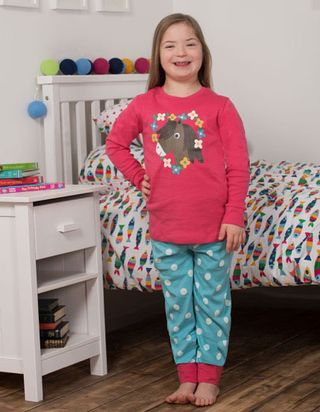
Natty modelling for Frugi
It's all about using the right language
For me it's all about language - particularly when it comes to telling mums that their baby may have Down's syndrome. For instance, the word 'risk' is such a negative word. Automatically when you say to a woman your risk is high, it's always a risk of something bad. However, they are listening to us more now and trying to change that word to 'likelihood' or 'chance'. But it's also when you hear things like: 'I'm sorry, I've got bad news.' Immediately you're thinking, this is terrible, something's wrong.
Screening for Down's syndrome and other conditions can be a good thing, but parents need balanced information
It doesn't happen so much now, but when Natty was a smaller baby, I frequently had the question 'didn't you have the test then?' It's based on the automatic assumption that I obviously didn't have the test because if I had I would have had a termination. I don't mind people asking me if I had the test. We did have the Nuchal fold measurement [Nuchal translucency (NT) scan] but people asking 'Oh but didn't you have the test' is very much part embedded in the idea that you can't have had the test because if you had she wouldn't be here. And I used to hear that and go back to the car and cry. I found that very difficult.
More: Hayley has written a set of conversation starters to help new parents get support and accurate information about Down's syndrome, as well as to help them talk through their feelings and concerns
It's all about properly explaining to the women what they are screening for, and what the implications will be whatever the result. I remember going for the Nuchal fold screening test and just saying to my mum on the phone: 'We're just going for peace of mind', which is incredibly naive because it's only about peace of mind if you get the result you want. It's why I would like to see learning disability nurses in place to help with that process. At the moment, the automatic assumption from the medical professionals is that termination is the only route and of course you need to do that quickly and hurry up.
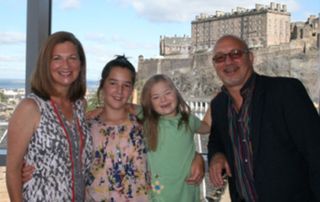
Natty with her sister Mia and mum and dad Hayley and Bob
Don't panic. Other mums will have felt the same as you
I think initially everybody goes through exactly the same shock. Very common themes are: 'Can I cope?' 'Am I good enough?' 'I didn't sign up for this?' 'I don't even know if I can do this'. In fact, I know a couple of mums that have even had their babies put into foster care and considered having them adopted. Then, with a bit of support, they realised they could do it and have them back. Often parents want to know what their family will look like, which is why I started the blog. I just wanted to see what my family was going to look like and how we were going to live. I wanted to see pictures of kids with Down's syndrome and their siblings doing typical things.
The thing that people almost universally do when their baby has any kind of health issue or disability is they immediately want to look too far ahead or plan out the entire life of their child. I remember doing that. She was only a couple of days old and I was thinking 'oh my goodness I don't think she'll get married and she's not going to have children'. But ordinarily when your baby is born you just think about the first few months. I always tell people not to look too far ahead. Just enjoy the moment.
It's about coming to a place of acceptance that your child is a bit different than what you'd expected. They perhaps won't go off to university and do those things you expect your children to, and that is a huge shock. Some people might describe it like a grieving process, but I always say: 'Whatever you are feeling, most of us parents have all felt the same so don't feel ashamed of that.' I remember feeling ashamed that I felt so shocked, but actually it's quite normal. It's okay; you'll come through it.
If you have another child, explain to them what Down's syndrome means
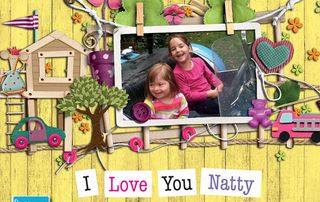
My other daughter Mia, 12, has written a book describing Down's syndrome to children. It's called 'I Love You Natty' and is a sibling's introduction to Down's syndrome, so it's really great for brothers and sisters when their new sibling has just been born. It's just to explain that they'll need a little bit of extra help with all the sort of things that you were going to do any way.
Perceptions surrounding young people and adults with Down's syndrome need to change
Natty is now approaching the end of being 'cute' and I think it's after this point that people find problems. So while you're cute like Natty there are modelling jobs, for example. Pictures fly around Facebook and people are open and willing to that - but if Natty ceases to be that cute little kid, will people still want her to model as an adult? When you cease to be cute, society has no place for you right now.
We went to stay at Foxes Academy (a specialist catering college and training hotel for young adults with learning disabilities) a couple of weeks ago. It was a fantastic hotel staffed by young people with a learning disability, who are learning how to hold down a job and learning life skills so they go out and become independent. But still they're always up against this idea that people with Down's syndrome are 'unemployable'. We have a long way to go.Save
Charlotte Whistlecroft is a former Family writer at GoodTo. She obtained a BA in Theology and Theological Studies at Durham University, going on to study a masters at City University London in 2016. Since leaving GoodTo she has worked as a Social Video Researcher at Mail Online and is now Assistant Producer at BBC Sport.
-
 Compromising may be killing your relationship - here are 5 ways to reach healthy compromises, according to relationship expert
Compromising may be killing your relationship - here are 5 ways to reach healthy compromises, according to relationship expertCompromising isn't always the best way to keep the peace in a relationship
By Charlie Elizabeth Culverhouse Published
-
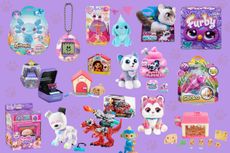 Best interactive pets for kids: 15 gift ideas for children of all ages
Best interactive pets for kids: 15 gift ideas for children of all agesFrom puppies to axolotls, take a look at our selection of the best interactive pets you can buy that are sure to be a hit with little animal lovers
By Sarah Handley Published